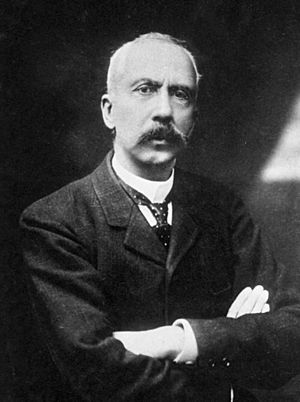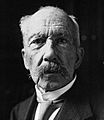Charles Robert Richet facts for kids
Quick facts for kids
Charles Robert Richet
|
|
|---|---|

Charles Richet
|
|
| Born | August 26, 1850 |
| Died | December 4, 1935 Paris
|
| Alma mater | Faculty of Medicine, Paris. |
| Awards | Nobel Prize in Physiology or Medicine (1913) |
| Scientific career | |
| Fields | Physiology |
| Institutions | Sorbonne University, Paris, France |
Charles Robert Richet (born August 26, 1850 – died December 4, 1935) was a French physiologist. A physiologist is a scientist who studies how living things work. He is famous for his important discoveries about how the body reacts to certain substances.
In 1913, Richet won the Nobel Prize in Physiology or Medicine. He received this award for his groundbreaking work on a condition called anaphylaxis. This discovery helped doctors understand severe allergic reactions.
Contents
Discovering Anaphylaxis
What is Anaphylaxis?
Anaphylaxis is a very serious and fast allergic reaction. It can happen when someone's body overreacts to something harmless. This might be a food, an insect sting, or a medicine. The reaction can be life-threatening if not treated quickly.
Richet's Early Research
Charles Richet began his research in the early 1900s. He was studying how animals reacted to toxins, which are harmful substances. He worked with another scientist, Paul Portier. They were trying to find ways to protect animals from these toxins.
The Key Experiment
Richet and Portier experimented with sea anemone toxins. They gave small doses of the toxin to dogs. They hoped this would make the dogs immune, or protected. Instead, they saw something unexpected. When they gave a second, even smaller dose later, the dogs had a severe reaction.
This reaction was the opposite of immunity. It was a strong, harmful response. Richet called this new reaction "anaphylaxis." The word comes from Greek words meaning "against protection."
Why Was This Important?
Richet's discovery changed medicine. Before his work, doctors did not understand these severe reactions. His research showed that the body's immune system could sometimes harm itself. This happens when it overreacts to a substance.
His findings helped explain many medical mysteries. It showed why some people had severe reactions to vaccines or medicines. It also helped explain why some people had deadly reactions to certain foods.
Richet's Legacy in Medicine
Impact on Allergies
Richet's work laid the foundation for understanding allergies. His discovery of anaphylaxis was a huge step forward. It led to new ways to diagnose and treat severe allergic reactions. Today, doctors use this knowledge to save lives.
Nobel Prize Recognition
In 1913, Charles Richet received the Nobel Prize. This award recognized his significant contribution to science. His research helped countless people worldwide. It continues to influence medical research today.
Beyond Anaphylaxis
Richet was a very curious scientist. He studied many different areas of physiology. He also explored other topics, like digestion and body temperature. His wide range of interests showed his dedication to understanding life.
Images for kids
See also
 In Spanish: Charles Robert Richet para niños
In Spanish: Charles Robert Richet para niños



